Results
-
£107.95
-
£164.95
-
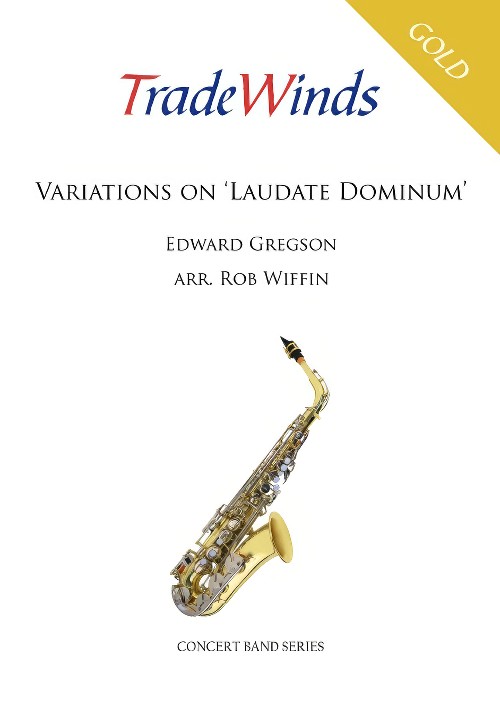 £89.95
£89.95Variations on 'Laudate Dominum' (Concert Band - Score and Parts) - Gregson, Edward - Wiffin, Rob
The theme is a noble hymn tune by Sir Hubert H. Parry, associated with the words 'O praise ye the Lord'. There are seven contrasting variations that will provide much interest to the player as well as the listener, the seventh of which is a fugato which leads into a triumphant finale where the theme is heard for the first time in its completion. This, we feel, will be a significant work for Wind Band as it has been for the brass band movement.
Estimated dispatch 7-14 working days
-
 £17.95
£17.95Variations on 'Laudate Dominum' (Concert Band - Score Only) - Gregson, Edward - Wiffin, Rob
The theme is a noble hymn tune by Sir Hubert H. Parry, associated with the words 'O praise ye the Lord'. There are seven contrasting variations that will provide much interest to the player as well as the listener, the seventh of which is a fugato which leads into a triumphant finale where the theme is heard for the first time in its completion. This, we feel, will be a significant work for Wind Band as it has been for the brass band movement.
Estimated dispatch 7-14 working days
-
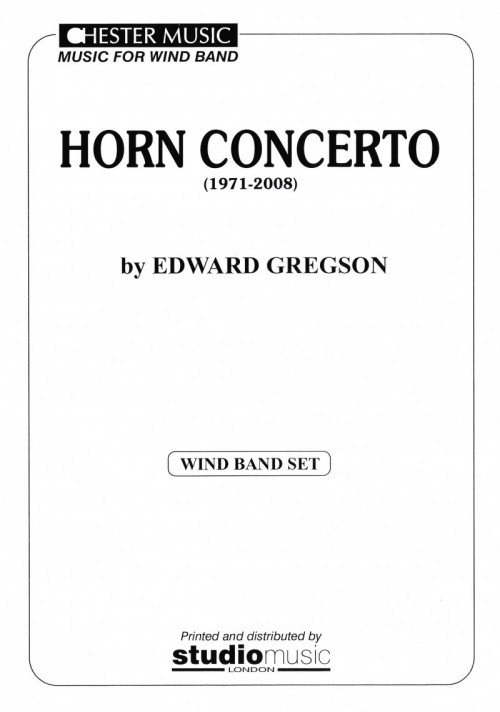 £137.95
£137.95Horn Concerto (Horn Solo with Concert Band - Score and Parts - Gregson, Edward
The concerto (for horn in F) is in three movements, following the usual pattern of fast, slow, fast. The first movement is structured around a traditionally laid out sonata form, the second movement is tranquil with a long, expressive melody, chromatically coloured whilst the finale takes its cue from the Mozartian horn concerto model, cast in rondo form with a rather jaunty main theme.Duration: 18 minutes
Estimated dispatch 7-14 working days
-
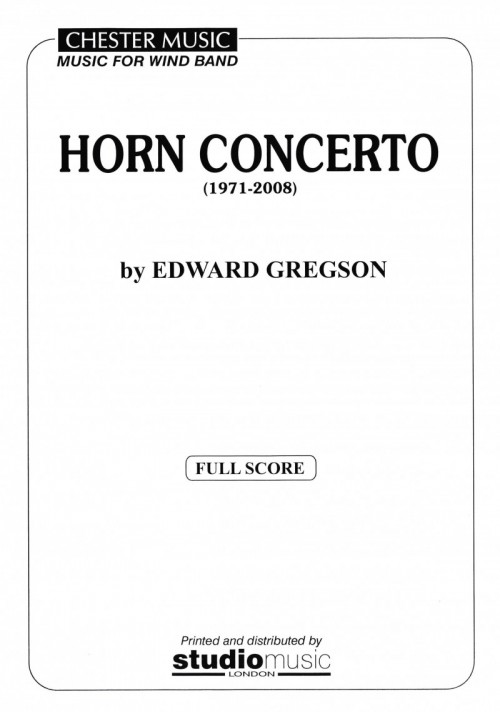 £27.95
£27.95Horn Concerto (Horn Solo with Concert Band - Score only) - Gregson, Edward
The concerto (for horn in F) is in three movements, following the usual pattern of fast, slow, fast. The first movement is structured around a traditionally laid out sonata form, the second movement is tranquil with a long, expressive melody, chromatically coloured whilst the finale takes its cue from the Mozartian horn concerto model, cast in rondo form with a rather jaunty main theme.Duration: 18 minutes
Estimated dispatch 7-14 working days
-
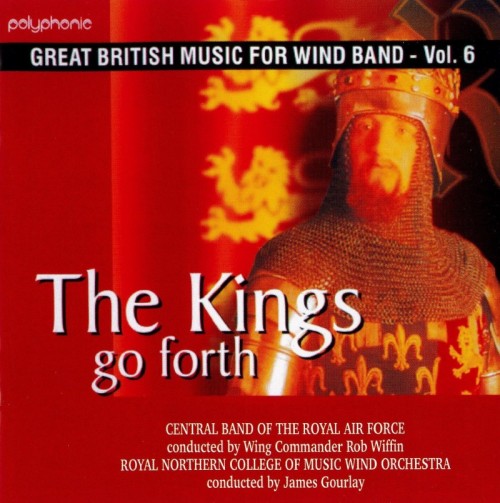 £13.95
£13.95The Kings Go Forth (Concert Band CD)
Great British Music for Wind Band Vol.6The Central Band of the Royal Air Force conducted by Wing Commander Rob Wiffin with the Royal Northern College of Music Wind Orchestra conducted by James Gourlay1Fiesta!Philip SparkeCentral Band of the Royal Air Force7.092Diversions - Variations on a Swiss Folk SongPhilip SparkeCentral Band of the Royal Air Force15.553-6New World DancesMartin EllerbyCentral Band of the Royal Air Force8.39 Earth Dance 2.08 Moon Dance 3.25 Sun Dance 3.066-8Sinfonietta No.1Philip SparkeCentral Band of the Royal Air Force14.05 Overture 2.41 Aria 5.32 Scherzo 5.259-11The Kings Go ForthEdward GregsonRoyal Northern College of Music Wind Orchestra17.17 The Church 4.27 The People 4.42 The State 8.05
Estimated dispatch 7-14 working days
-
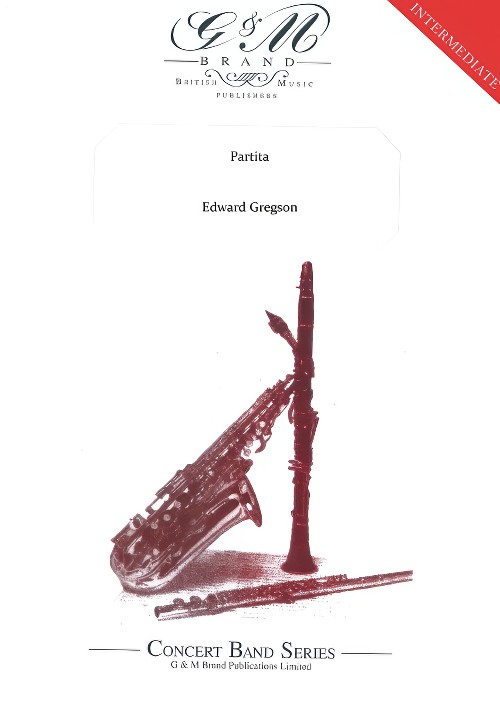 £84.95
£84.95Partita (Concert Band - Score and Parts) - Gregson, Edward
Partita' was originally composed for brass band in 1973. The work is in three movements, and uses material based on the 13th century plainsong 'Dies Irae". the opening Intrada is sombre. the second movement is a 'chorale and variations. the chorale melody follows the main outline of the plainsong. the five variations are varied in mood and intensity. the final March is much happier in mood and has a lyrical tune in the middle first heard on horns. However, references to the 'Dies Irae' are still apparent and the final bars of the work contain a quote from the opening movement.
Estimated dispatch 7-14 working days
-
 £16.95
£16.95Partita (Concert Band - Score Only) - Gregson, Edward
Partita' was originally composed for brass band in 1973. The work is in three movements, and uses material based on the 13th century plainsong 'Dies Irae". the opening Intrada is sombre. the second movement is a 'chorale and variations. the chorale melody follows the main outline of the plainsong. the five variations are varied in mood and intensity. the final March is much happier in mood and has a lyrical tune in the middle first heard on horns. However, references to the 'Dies Irae' are still apparent and the final bars of the work contain a quote from the opening movement.
Estimated dispatch 7-14 working days
-
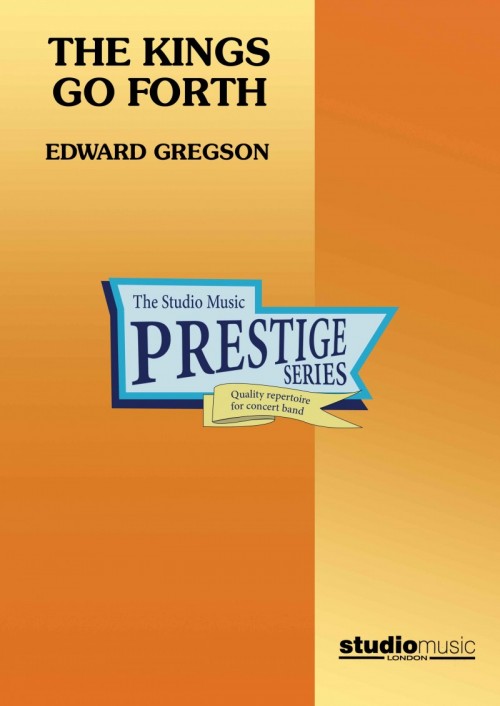 £44.95
£44.95The Kings Go Forth (Concert Band - Score only) - Gregson, Edward
This work was commissioned jointly by the Royal Air Force Music Service and an American Universities Consortium and received its world premiere during the 1996 RAF British Tour. It is scored for large symphonic wind band, with the addition of voices.The work is a sequel to the highly successful The Sword and the Crown which was premiered in 1991 by the mass bands of the RAF (and also was an RAF commission). That work was based on music written for the Royal Shakespeare Company productions of The Plantagenets and Henry IV, parts 1 and 2 (for productions between 1988 and 1991).The Kings go Forth is similarly based on musical material for those productions. It uses different thematic elements and incorporates them into a three-movement suite entitled: The Church; The People; The State.This reflects the fact that in Henry IV Parts 1 and 2, Shakespeare introduces The People as an important element in the dramatic structure. The Church and The State are, of course, both leitmotivs throughout the entire plays. An Agnus Dei is heard at the outset from a solo voice. The ensuing Dies Irae is a fast and, at times, quite violent dance. The two sections which form the basis of the second movement, The People, concentrate on popular elements and reflect to some extent the tavern scenes in the plays. The two ideas presented are a harvest hymn reflecting the country scenes set in Gloucestershire, and a jazzy, 'up-tempo' dance based on the medieval song, Sumer is icumen in. The third movement, The State, deals with the Kings theme in the title of the piece. The juxtaposition of battle music with funeral music for Henry IV and Henry VI leads to a reworking of the leitmotif from the beginning of the work. The final section is Coronation music for Henry V, eventually leading to a triumphant climax. - Edward GregsonDuration: 17.15Recorded on QPRM 125D Festival of Music 1996, Massed Bands of the Royal Air ForceRecorded on QPRM 134D The Kings Go Forth, Royal Northern College of Music Wind Orchestra
Estimated dispatch 7-14 working days
